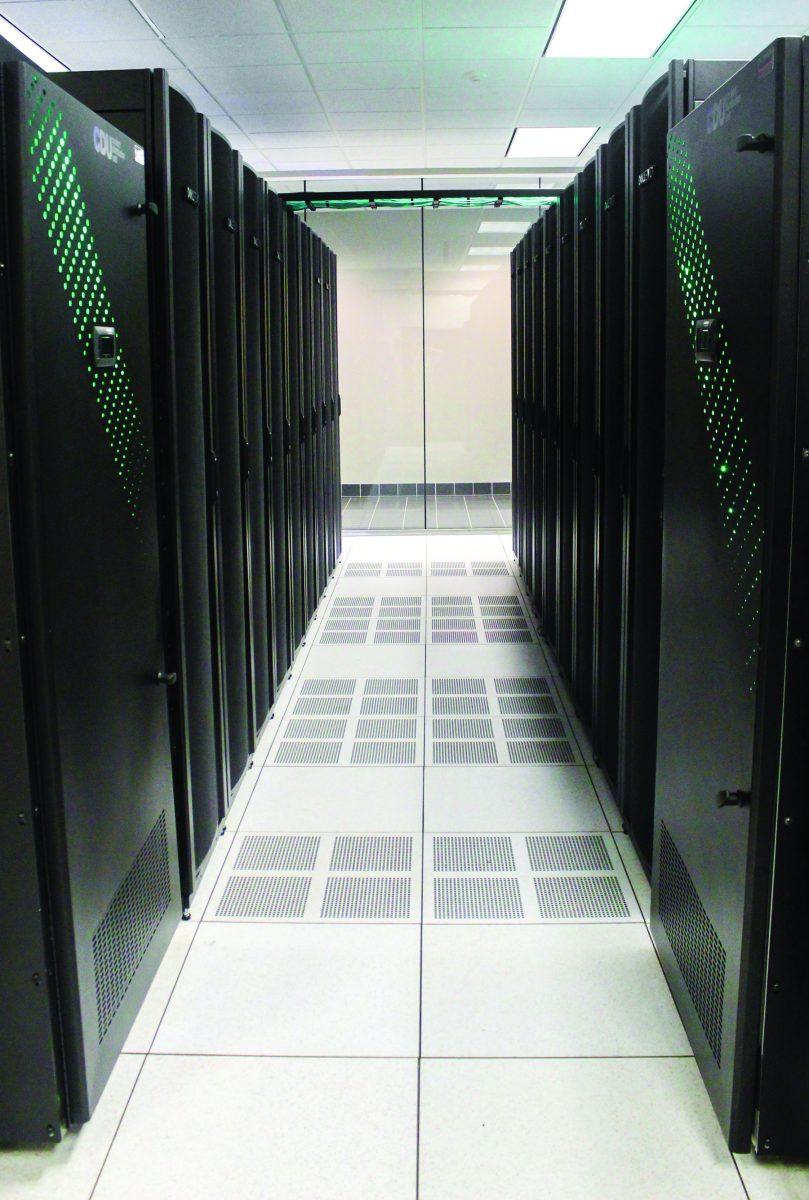Mississippi State University recently became home to Orion, a supercomputer currently ranking as the fourth fastest supercomputer housed in a U.S. university.
Orion also holds the place of 62nd fastest in the world, according to Top500.org, a website which scores the world’s strongest non-distributed computer systems.
Trey Breckenridge, the director of MSU’s High Performance Computing Collaboratory (HPC²), believes Orion has already begun to benefit MSU.
“The benefits to MSU are numerous,” Breckenridge said. “We’ve already received a tremendous amount of positive attention and international exposure for the university and our research capabilities as a result of the system.”
A supercomputer is, as defined by Breckenridge, one of the fastest, most powerful computers in the world at any given time.
Orion, located in the Thad Cochran Research Center, was primarily funded by the National Oceanic and Atmospheric Administration (NOAA) to support NOAA’s research and development activities in environmental, weather and climate modeling, as well as autonomous vehicle design and operation, Breckenridge said.
“MSU and NOAA researchers, as well as academic collaborators from around the nation, will use Orion to conduct and advance their research and scientific activities,” Breckenridge said. “As an example, Orion will be used to enhance weather forecasting models, ultimately providing for more accurate projection of hurricane tracks.”
According to Breckenridge, MSU has a longstanding and extremely successful research relationship with NOAA. MSU leads NOAA’s Cooperative Institute, the Northern Gulf Institute, which is a partnership of six academic institutions focused on addressing national strategic research and education goals within the northern Gulf of Mexico region.
The university also closely partners with several NOAA units which are co-located in the MSU Science and Technology Center at the NASA John C. Stennis Space Center, Breckenridge said.
MSU’s HPC² department is a coalition of MSU research institutes and centers that share a common need for utilizing supercomputing technologies to conduct their research, education and service activities, Breckenridge said.
“HPC² was started in 1990 as a National Science Foundation Engineering Research Center focused on computational field simulations, but it has evolved over the years into a unit with broad activities including the areas of manned and autonomous vehicular design and operation, advanced manufacturing, cyber security, environmental modeling, biocomputing and molecular modeling,” Breckenridge said.
Orion’s functionality extends outside HPC²’s offices to other departments across campus. Jamie Dyer, a professor in MSU’s Department of Geosciences, has also enjoyed working with the supercomputer.
Dyer’s research, also NOAA funded, is focused on the generation, testing and application of numerical weather prediction (NWP) model frameworks, with additional attention on the use of Weather Research and Forecasting (WRF) models in hydrologic applications.
“The newest supercomputer gives me unprecedented abilities to not only set up and test model components quickly, but it allows me to run multiple simulations in less time than I have ever been able to before,” Dyer said. “Through this work the new supercomputer directly contributes to NOAA’s mission of saving lives and property.”
According to Dyer, Orion’s rapid data collection and analysis directly translates into stronger and more reliable results, as well as ultimately improved predictions of critical meteorological processes.
Orion is not MSU’s first supercomputer. In fact, the university has had a supercomputer place in 27 of the last 48 lists of the 500 fastest supercomputers in the world, dating back to 1996.
MSU’s history of high performance computing began in the late 1980’s. Many of the core technologies and architectural designs in today’s supercomputers were pioneered and developed at MSU, according to Breckenridge.
“For example, the software utilized by most supercomputing applications today to enable the use of very large numbers of processors in parallel was co-developed at the MSU Engineering Research Center,” Breckenridge said. “Over that same time frame, the university has built and operated a number of supercomputers.”
Hossein Lofti, a second-year PhD student in meteorology, is currently the only student working with Orion, supervised by Dyer. He uses the supercomputer to observe real-time satellite images in weather prediction models to enhance forecasts in an agricultural area throughout the annual growing season.
This research can be applied to the entire nation, but Lofti is especially interested in the lower Mississippi River alluvial valley, also known as LMRAV. The amount of computing his research requires would not be possible without Orion.
“Undoubtedly, processing such a huge data needs high performance computing systems,” said Lofti. “Interestingly, in the near future, we will run a new released weather forecasting model on the NOAA supercomputer in the global scale.”
While Orion is already helping researchers throughout MSU, Breckenridge said he believes it will also help draw in new students, both undergraduate and graduate, and faculty, as well as enable more research collaborations with universities and organizations around the world.
In fact, MSU has started several new research projects as a result of the successful partnership with NOAA to fund Orion, according to Breckenridge.
“The most important benefit of Orion is the scientific discoveries that it will enable, discoveries that will help our local communities and make life better for the citizens of our state, nation and the world,” Breckenridge said.
MSU’s Orion named fourth fastest supercomputer in U.S. academia
Grace Goodman | The Reflector
Located in the Thad Cochran Research Center, Orion is the world’s 62nd fastest supercomputer.
0
Donate to The Reflector
Your donation will support the student journalists of Mississippi State University. Your contribution will allow us to purchase equipment and cover our annual website hosting costs.
More to Discover













